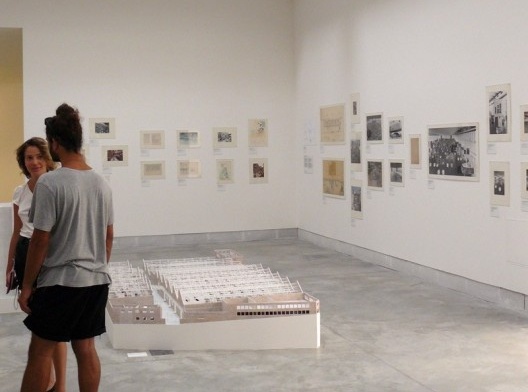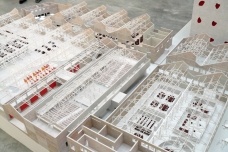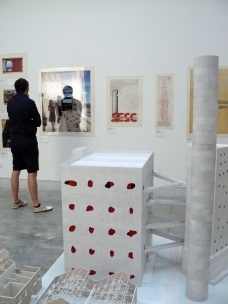Lina Bo Bardi brings to the exhibition 'People meet in architecture' some of her most successful projects in creating places for everyday life. These works stand out by combining a strong urban presence to a warm welcome to people in their daily life.
The drawings gathered here show that this feature is not accidental, but the result of design strategies. In them we see the great forms heavily populated by children playing, people talking among animals, native plants, artworks and furniture. Situations taking place under the old factory converted into a leisure center, the huge slab of the span of the Museum or in the restored historic houses in Bahia
These are not mere illustration showing the project, as it is usual in architecture. They appear right in the moment of conception, as if they were checking if the projected forms may contribute to the people´s lives.
In these drawings Lina Bo Bardi makes use of her experience with the Italian architect Gio Ponti. As in projects of this architect, the drawings are accompanied by plenty of writings that make the architecture a narrative of life that will unfold there. They are reminders to herself of how certain aspects of the project should be developed throughout the design and construction.
The line apparently simple and deliberately unadorned is opposed to the virtuoso drawing which, according to her, stifles the image and overlaps the idea. She prefers to follow the design of Le Corbusier, with his clean line called by her the intellectual drawing. However, those are drawings that have something childish, not in the sense of child's naivety, but in its spontaneity.
There is something of the decorative arts in her furniture design, visual communication, objects, construction details and even vegetation. They function as the classical ornamentation, which brought the geometry of the great forms to a human scale. However, she acknowledges that this approach is not a problem of scale but of culture.
She pays tribute to Yves Klein and Mayakovski in designing forests of tallow-wood, wooden masts present in festivals in Brazil, dissolving the separation between erudite and popular culture.
She exhibits the artworks in MASP in transparent supports and walls to bring them closer to the visitors and incorporate the artworks into city life.
Lina reproduces African constructions and decorations in Benin´s House, a center for valorization of the main ethnic group of former slaves´ culture in Bahia, exactly where they were tortured till the end of slavery.
Attitudes loaded with political density that are rare in contemporary cultural action.
Lina Bo Bardi (Rome, 1914 - São Paulo, 1992). Graded in Rome in 1939, she emigrates to Brazil in 1946, after living and working in Milan during the war years. Along with her husband, Pietro Maria Bardi, she founds and directs the Art Museum of São Paulo in 1947, an important center of modernization of the Brazilian culture. Between 1958 and 1964 she works in Salvador, the first colonial capital of Brazil, where she furthers her interest in African-Brazilian popular art. She founds and directs the Modern Art Museum of Bahia and the Popular Art Museum. After the military coup of 1964 she returns to São Paulo, where she dedicates to finish building the second home of MASP and to a number of scenographic projects. In the late 1970s she projects the Leisure Center Fábrica Pompéia, where she mounts a series of exhibitions based on her research on popular culture. She returns to Salvador in 1986, after the democratization of the country and produces a set of projects for the town. The Glass House, her residence designed in 1951, now houses the Instituto Lina Bo and P. M. Bardi.
note
exhibition "Lina in Venice" at the 12th International Architecture Biennale in Venice, Renato Anelli text, image selection for the exhibition Instituto Lina Bo Bardi P M Bardi (Renato Anelli, Anna Carboncine and Malu Vilasboas)
about the author
Renato Anelli, Professor, Department of Architecture and Urban Planning, University of São Paulo, Campus São Carlos, CNPq Researcher and Counselor of the Instituto Lina Bo and P. M. Bardi.






